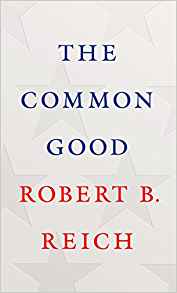 Robert B. Reich, The Common Good (New York: Knopf, 2018), 193pp.
Robert B. Reich, The Common Good (New York: Knopf, 2018), 193pp.
Robert Reich was fourteen years old when he heard the challenge of President John Kennedy to do something not just for yourself but for your country. Seven years later and fresh out of college, he took a low level internship with Robert Kennedy. "It was not a glamorous job, to say the least," he recalls, "but I told myself that in a very tiny way I was doing something for the good of the country." Reich went on to serve in three presidential administrations and write fifteen books. Today he is Chancellor's Professor of Public Policy at the University of California, Berkeley.
In our deeply divisive times, Reich brings us back to "we the people" and our constitutional call to "promote the general welfare." We've made many gains in the last fifty years, but he fears that we have lost our civic connectedness. He challenges us to commit ourselves to public affairs and not just private interests, to the common good and not just self-aggrandizement, to all of society's stakeholders (workers, schools, towns, the environment, consumers, etc.) and not just to economic shareholders.
Despite our many differences, we all have shared ideals, mutual commitments, and reciprocal obligations to society as a whole. And so we voluntarily enter a social contract that binds us together. We agree to respect the rule of law, to tell the truth, and to pay our taxes. We commit ourselves to the public education of all people, to political equality, to economic opportunity, and to protect our democratic institutions.
This call to the common good is threatened by a growing and deep distrust in our basic civic institutions — government, corporations, and media. In particular, Reich documents our scorched earth politics, the maximization of corporate profits at any social price, and a free market system that has resulted in well-documented inequalities of wealth and income.
Reich admits that it will be a "daunting challenge" to put the common good at the center of our civic life and discourse. The challenge is not just a matter of new laws, different policies, or even ethics. Rather, it's the recovery of a "pubic morality," especially among our political and national leaders. In the last part of his book Reich commends a proper sense of honor and shame, the resurrection of truth, and a commitment to civic education. One sentence in particular by Reich grabbed my attention: "If there is no common good, there is no society." At the end of the book, he includes a discussion guide with twenty-two questions.


